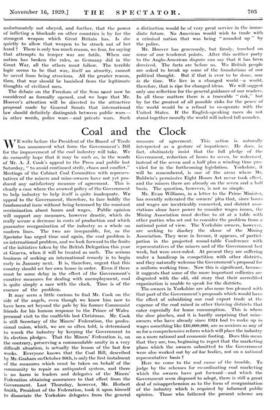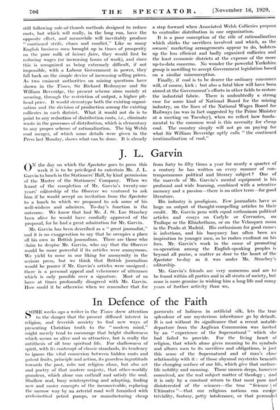Coal and the Clock
WE write before the President of the Board of Trade has announced what form the Government's Bill for the improvement of the coal industry will take. We do earnestly hope that it may be such as, in the words of Mr. A. J. Cook's appeal to the Press and public last Saturday, " to avoid continued strife, chaos and conflict." Meetings of the Cabinet Coal Committee with represen- tatives of the miners and mine-owners have not yet pro- duced any satisfactory measure of agreement. This is clearly a case where the avowed policy of the Government to help industry to help itself is quite inadequate. We appeal to the Government, therefore, to face boldly the fundamental issue without being bemused by the constant recrimination about hours and wages. Public opinion will support any measures, however drastic, which do really secure a decrease in costs of production and which guarantee reorganization of the industry as a whole on modern lines. The two are inseparable, for, as the Spectator has urged time and again, the coal problem is an international problem, and we look forward to the fruits of the initiative taken by the British Delegation this year at Geneva, when it will be treated as such. The serious business of seeking an international remedy is to begin early in January next. It is, therefore, urgent that this country should set her own house in order. Even if there must be some delay in the effect of the Government's curative measures for dealing with unemployment, coal is quite simply a race with the clock. Time is of the essence of the problem.
It may seem a little curious to find Mr. Cook on the side of the angels, even though we know him now to have been set beyond the pale by his former Communist friends for his human response to the Prince of Wales, personal visit to the coalfields last Christmas. Mr. Cook is still Secretary of the Miners' Federation, the profes- sional union, which, we are so often told, is determined to wreck the industry by keeping the Government to its election pledges. That the Miners' Federation is, on the contrary, preserving a commendable sanity in a very difficult situation, is actually the lesson of the last few weeks. Everyone knows that the Coal Bill, described by Mr. Graham on October 39th, is only the first instalment of the measures which must be• taken on behalf of the community to repair an antiquated system, and there is no harm in leaders and delegates of the Miners' Federation obtaining assurances to that effect from the Government. Last Thursday, however, Mr. Herbert Smith, President of the Federation, took it upon himself to dissociate the Yorkshire delegates from the general measure of agreement. This action is naturally interpreted as a gesture of impatience. He does, in fact, obstinately insist that the full pledge of the Government, reduction of hours to seven, be redeemed, instead of the seven and a half plus a winding time pro- vided for in the forthcoming legislation. Yorkshire, it will be remembered, is one of the areas where Mr. Baldwin's permissive Eight Hours Act never took effect, and the miners there are already on the seven and a half basis. The question, however, is not so simple.
Mr. Evan Williams, in a letter to the Prime' Minister, has recently reiterated the owners' plea that, since hours and wages are inextricably connected, and district asso- ciations alone have power to consider wages issues, the Mining Association must decline to sit at a table with other parties who set out to consider the problem from a national point of view. The Yorkshire owners, however, are seeking to disobey the ukase of the Mining Association. They were in favour, it appears, of partici- pation in the projected round-table Conference with representatives of the miners and of the Government last week, but were over-ruled. At present they are suffering under a handicap in competition with other districts, and they naturally welcome the Government's proposal for a uniform working time. Now this is significant, because it suggests that some of the more important collieries are disgusted with the old, old story that their accredited organization is unable to speak for the districts.
The owners in Yorkshire are also none too pleased with that part of the Government's proposals which would have the effect of subsidizing our coal export trade at the expense of the coal raised in other thriving districts that cater especially for home consumption. This is where the shoe pinches, and it is hardly surprising that mine- owners who have already since 1924 had to make up in wages something like £10,000,000, are as anxious as any of us for a comprehensive reform which will place the industry on a more rational and economic footing. Does this mean that they are, too, beginning to regret that the marketing plans which the owners submitted to the Government were also worked out by ad hoc bodies, not on a national representative basis ?
Here we come to the real cause of the trouble. To judge by the schemes for co-ordinating coal marketing which the owners have put forward—and which the Government seem disposed to adopt, there is still a great deal of misapprehension as to the form of reorganization of the industry which is required by informed public opinion. Those who fathered the present scheme are still following rule-of-thumb methods designed to reduce costs, but which will really, in the long run, have the opposite effect, and meanwhile will inevitably produce " continued strife, chaos and conflict." Like so many English business men brought up in times of prosperity on the pure milk of laissez faire, they would first be reducing wages (or increasing hours of work), and since this is recognized as being extremely difficult, if not impossible, with a Labour Government in power, they fall back on the simple device of increasing selling prices. As two eminent authorities on mining questions have shown in the Times, Sir Richard Redmayne and Sir William Beveridge, the present scheme aims mainly at securing, through the restriction of output, a higher pit- head price. It would stereotype both the existing organi- sation and the division of production among the existing collieries in each district. What it would not do is to point to any reduction of distribution costs, i.e., eliminate waste in the processes of distribution, which is elementary to any proper scheme of rationalization. The big Welsh coal merger, of which some details were given in the Press last Monday, shows what can he done. It is already a step forward when Associated Welsh Collieries propose to centralize distribution in one organization.
It is a poor conception of the role of rationalization which shirks the sacrifices involved and which, as the owners' marketing arrangements appear to do, bolsters up the less efficient and badly organized collieries and the least economic districts at the expense of the more up-to-date concerns. No wonder the powerful Yorkshire group is unwilling to accept.Government legislation based on a similar misconception.
Finally, if coal is to be dearer the ordinary consumer will, of course, kick ; but also a fatal blow will have been aimed at the Government's efforts in other fields to restore the industrial fabric. There is undoubtedly' a strong case for some kind of National Board for the mining industry, on the lines of the National Wages Board for Railways (as was in fact suggested by the Prime Minister at a meeting on Tuesday), when we reflect how funda- mental to the common weal is this necessity for cheap coal. The country simply will not go on paying for what Sir William Beveridge aptly calls " the continued irrationalization of coal."









































 Previous page
Previous page